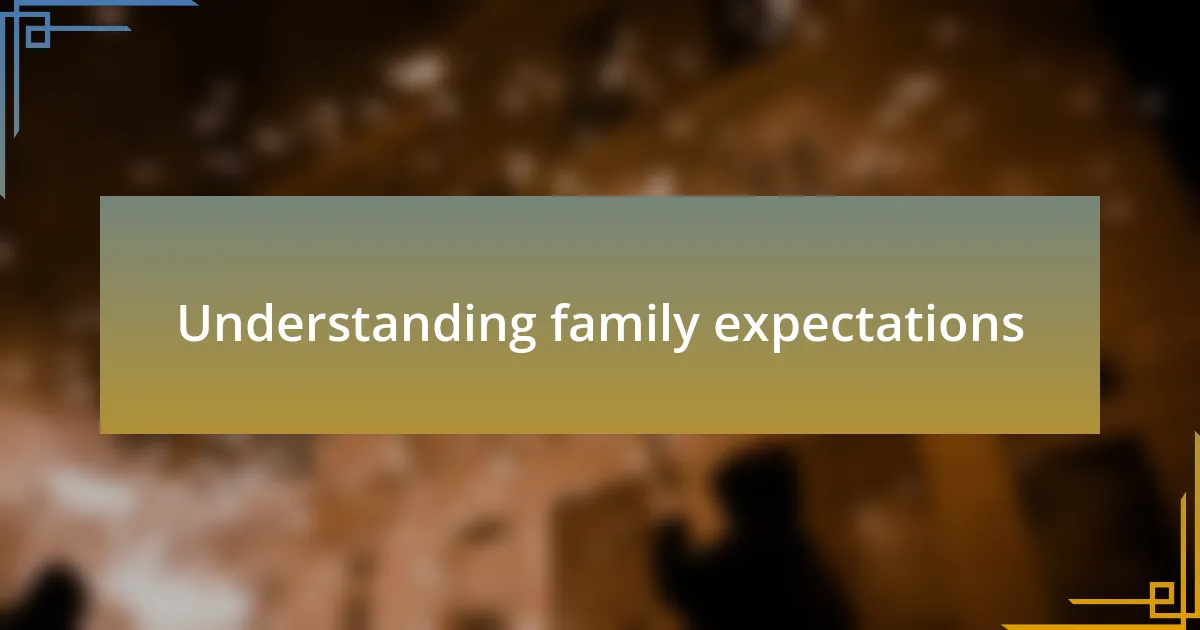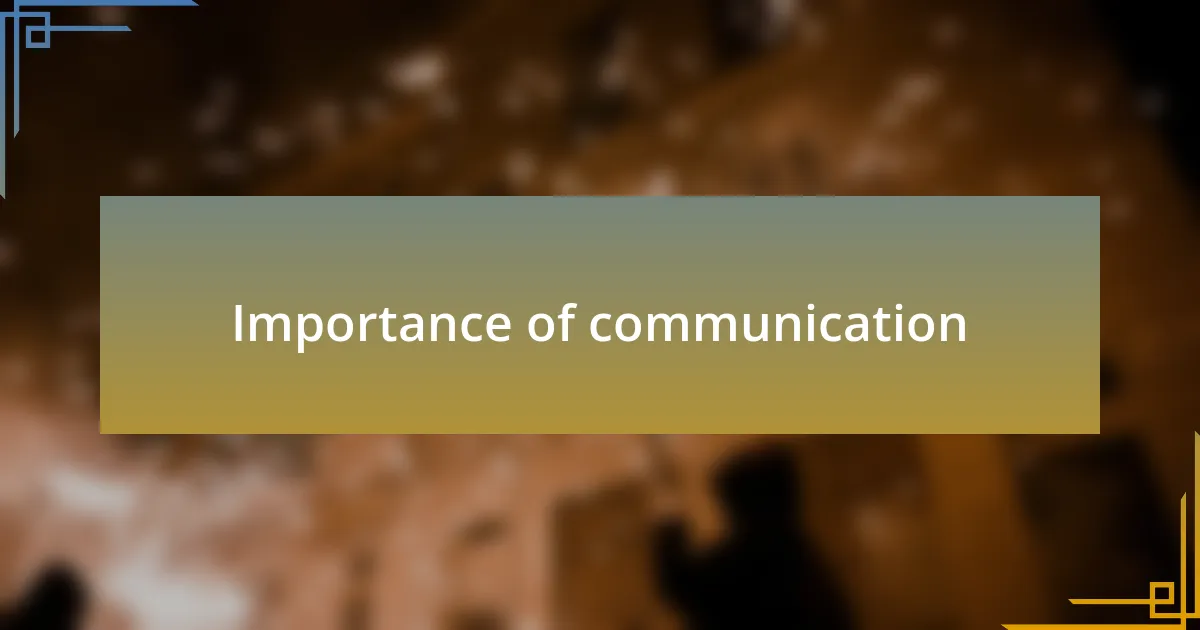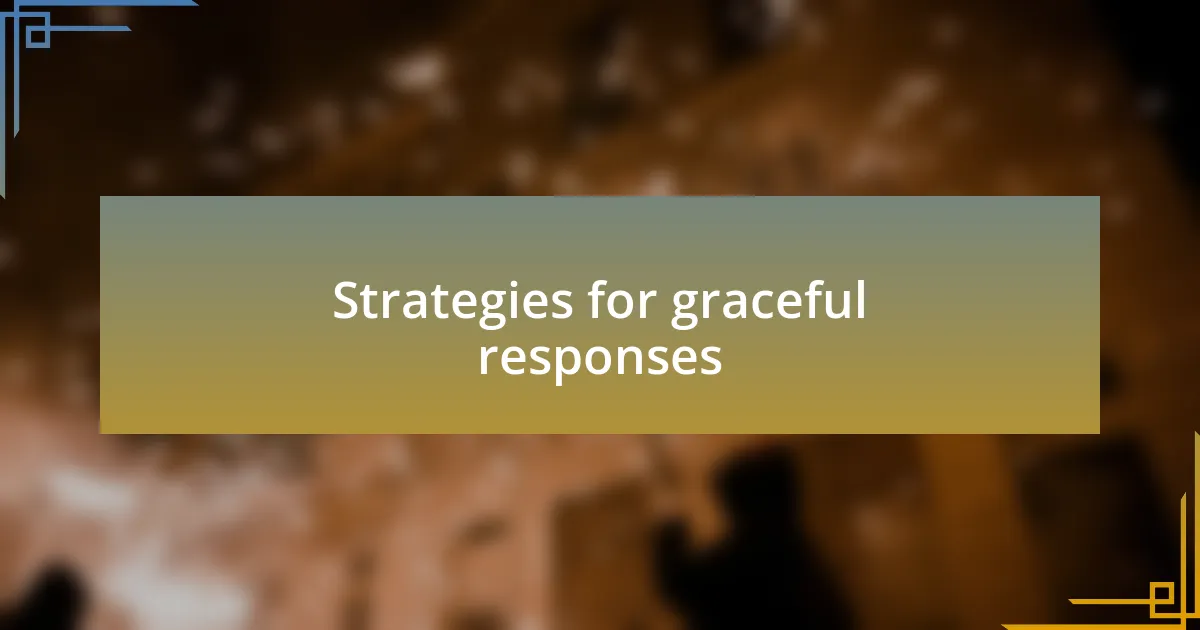Key takeaways:
- Empathy and open communication are essential for understanding and managing family expectations during wedding planning.
- Setting realistic boundaries allows for a collaborative planning process while maintaining personal vision and well-being.
- Active listening and using “I” statements can foster respectful dialogues, minimizing conflicts and enhancing mutual understanding.
- Proactive communication and flexibility help in navigating unexpected changes and aligning family expectations with personal desires.

Understanding family expectations
Navigating family expectations can feel like walking a tightrope. I recall a time before my wedding when my parents expressed their desire for a traditional ceremony while I was leaning toward something more contemporary. It made me wonder: how can I honor my family’s wishes without sacrificing my vision?
Understanding these expectations requires empathy and open communication. I remember sitting down with my family, sharing what the wedding meant to me, and hearing their hopes in return. This exchange not only deepened our connection but also allowed us to find common ground, transforming potential conflict into collaboration.
It’s essential to recognize that family expectations often stem from love and tradition. I felt a mix of gratitude and pressure when my family shared their dreams. It made me reflect—how much of their vision was about them, and how much was about me? Understanding this balance can guide you toward a harmonious outcome.

Importance of communication
Communication is the cornerstone of managing family expectations effectively. I remember a late-night conversation with my sister, where we both laid our cards on the table. We shared our apprehensions and desires for the wedding, which ultimately made me realize how often we assume understanding when, in reality, we’re operating on different wavelengths. Have you ever felt that way with your family?
It can be challenging to express your needs while also validating their feelings. I once found it daunting to explain to my parents why I preferred a smaller gathering instead of their grand vision. However, the more I voiced my thoughts, the more they understood my perspective, leading to some heartwarming compromises. This taught me that feeling heard can significantly impact family dynamics, ultimately enriching the wedding planning experience.
Moreover, transparent communication can preempt misunderstandings before they escalate. During one of our discussions, my mother mentioned how she wanted to include certain traditions because they connected her to family history. By addressing her concerns directly, I could weave in elements of tradition that resonated with both of us, turning potential disappointment into shared joy. Isn’t it fascinating how opening a dialogue can transform the way we approach expectations?

Setting realistic boundaries
Creating realistic boundaries is an essential part of navigating family expectations during wedding planning. I recall a moment when my aunt proposed a lavish reception, dreaming of a fairy-tale affair. I had to gently remind her of my budget constraints, realizing that establishing clear boundaries allowed us to focus on what truly mattered without unnecessary stress. Have you considered what boundaries might protect your well-being in this whirlwind?
Sometimes, it’s about knowing where to draw the line. I remember feeling overwhelmed listening to my family’s endless suggestions about everything from the venue to the guest list. By calmly expressing my preferences and setting limits on the decisions that truly mattered to me, I was able to foster a supportive environment where everyone felt included while still maintaining my vision for the day. Is it possible, I wondered, to honor their enthusiasm while still protecting my dream?
Boundaries don’t mean shutting others out; rather, they invite healthier conversations. During my planning process, I found myself often reassuring my parents that I valued their input, but I also needed to take the lead in specific areas. By framing it this way, they became more receptive and respectful of the boundaries I set, making it a collaborative effort rather than a tug-of-war. Isn’t it empowering to feel in control while still nurturing family relationships?

Strategies for graceful responses
One effective strategy for graceful responses is to practice active listening. I remember sitting down with my mother when she had her heart set on a particular floral arrangement. Instead of immediately dismissing her idea, I made it a point to listen to her rationale. Validating her feelings not only diffused the tension but also opened the floor for a productive exchange of ideas. Have you tried acknowledging your family’s wishes before sharing your own?
Additionally, using “I” statements can transform conversations and help convey your feelings without seeming confrontational. I found that instead of saying, “You are pushing too hard,” I could express, “I feel overwhelmed when I receive too many suggestions.” This small shift in wording made my family more understanding of my emotional state, allowing for a dialogue that felt respectful and collaborative. Is it possible that simply altering how we communicate can lead to more harmonious discussions?
Lastly, timing can play a crucial role in how your responses are received. I discovered the value of choosing moments when emotions were calm to explore sensitive topics. For instance, discussing the wedding favors at a quieter family gathering made it easier for everyone to approach the subject without heightened emotions. Have you noticed how the right timing can change the entire mood of a conversation?

Practical tips for wedding planning
When it comes to wedding planning, staying organized is crucial. I remember using a simple spreadsheet to track everything from guest lists to vendor contacts. This not only eased my anxiety but also provided clarity when family members inquired about details. Have you ever considered the comfort that a well-structured plan can bring during a potentially chaotic time?
Another practical approach is to set clear priorities for your wedding day. I sat down with my partner to list what mattered most—be it the venue, the food, or the music. Focusing on these vital components made it easier to say “no” to suggestions that didn’t align with our vision. Isn’t it fascinating how defining your core values can enhance decision-making and preserve your energy?
Don’t underestimate the power of delegation. I found that sharing responsibilities with trusted family members lightened the load significantly. For example, my cousin happily took charge of the décor while my best friend handled invitations. This not only forged a sense of teamwork but also allowed others to feel invested in our special day. Could inviting others to contribute be a key to reducing stress while fostering closer relationships?

Personal reflections on my journey
Reflecting on my journey through wedding planning, I often think about the delicate balance between my vision and family expectations. There was a moment when my mother presented a guest list that seemed overly ambitious, and I could feel the tension rising. Instead of rejecting her ideas outright, I chose to engage in a heartfelt conversation where I expressed my hope for an intimate gathering. This approach not only eased my worries but strengthened our bond, demonstrating how honesty can be a bridge to understanding.
I distinctly remember a specific weekend spent poring over cake flavors with my fiancé. While I leaned toward experimenting with unique flavors, my sister insisted on classic options. After some spirited debate, we decided to compromise and feature both, which made everyone happy. Reflecting on this experience, I realized that embracing different perspectives often leads to richer, more memorable choices. Have you ever noticed how flexibility can transform a situation into a collaborative effort?
Throughout this process, I learned to celebrate my decisions rather than feel burdened by expectations. I vividly recall standing in front of a mirror in my wedding dress, lost in the moment, feeling a profound sense of joy. It dawned on me then that prioritizing my own happiness was not selfish but essential. Isn’t it interesting how sometimes, the most graceful handling of expectations stems from simply honoring our own desires?

Lessons learned for future events
Navigating family expectations during wedding planning has been a truly enlightening experience for me. One key takeaway is the importance of setting clear boundaries. I remember a situation where my aunt kept suggesting extravagant ideas that didn’t align with my budget. By gently yet firmly expressing my financial constraints, I not only stayed true to my vision but also fostered respect for my choices. Have you ever found that setting boundaries can create a safe space for open dialogue?
Another lesson I learned is the power of proactive communication. Early on, I made it a priority to involve my family in conversations about the wedding direction. For instance, I organized a casual family dinner to share my ideas and gather their thoughts. This not only helped align expectations but also calmed any potential conflicts. Reflecting on that, it’s clear that being proactive can turn conversations into collaborative brainstorming sessions. Wouldn’t it be interesting to see how much smoother future events could be with just a bit more transparency?
Lastly, I realized the importance of anticipation and flexibility. A week before the wedding, a family member suggested a last-minute change to the seating arrangement, which threw me into a bit of a frenzy. Instead of panicking, I took a deep breath and evaluated the situation. Adapting on the fly not only diffused tension but also reminded me that flexibility is often key to making the most of unexpected situations. How often do we overlook the magic that can happen when we simply go with the flow?